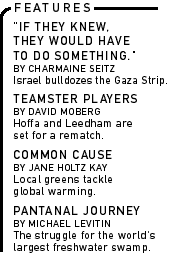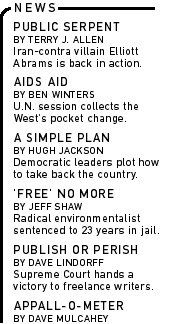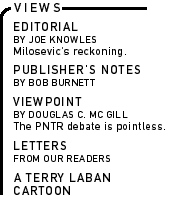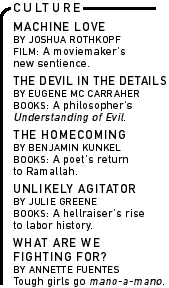

|

|

|

|
|
|
| |
|
|
|
As the Teamsters Union heads into fall elections for its top officers, there are really two campaigns underway. One is the presidential contest between incumbent James P. Hoffa and challenger Tom Leedham, a local union president from Oregon. The other is an effort to persuade the government to end its 12-year oversight of internal union conduct that has deeply influenced but not completely reshaped the big union, long under mob control and marred by corrupt, undemocratic rule. With his famous name, money and the power of incumbency, Hoffa is the favorite. But Leedham, the candidate of the Teamsters' persistent if beleaguered reform movement, has a chance, since the 1.4 million members will pick their officers in a national mail-in ballot in October, thanks to the 1989 agreement between the union and the federal government. The campaign to end that consent decree is a trickier proposition, depending not only on progress in cleaning up the union, but on dicier external politics. At the union's convention here in late June, Hoffa pursued both objectives, but the
At the same time, Hoffa's supporters displayed impatience, if not contempt, toward the reality of democratic unionism, raising the question of how deeply the union's culture has changed and how secure democracy will be without government overseers. Although critics spoke more freely than at conventions of the '80s, there were still obstacles to open debate. Hoffa delegates also staged walkouts during Leedham's nomination acceptance speech and the election officer's reprimand of Hoffa for using union property to campaign. And one of the biggest standing ovations of the convention came when Chicago leader Frank Wsol opined that "we could save $20 million [an overstated figure] if we didn't have an election." Ultimately, the safeguard of democracy in a union is not just the official rules, but the internal political culture. On that front, the Teamsters still have a long way to go. Hoffa used the convention not only to defend his record, but to vilify previous Teamsters President Ron Carey for dividing and bankrupting the union after his 1991 election. The Carey administration certainly had its faults: Facing a perjury trial in August, Carey was removed from office for failing to stop a scheme to channel union funds through other organizations for his successful 1996 election campaign against Hoffa. When the election was re-run two years later, Hoffa beat the little-known, poorly financed Leedham, who still got nearly 40 percent of the votes (with another 5 percent going to a candidate now running with Leedham). But the Hoffa camp exaggerates Carey's failings and ignores his achievements: The main financial drain on union coffers in the early '90s was a convention-approved increase in strike benefits. While Carey's attacks on the "old guard" raised hackles of the union establishment, that same old guard systematically sabotaged Carey's initiatives and even union-sanctioned strikes. And Carey was the leader of the landmark 1997 UPS strike that Hoffa now celebrates without mentioning his predecessor. Hoffa further sought to marginalize reformers in the name of "unity," even though his supporters helped keep alive the "civil war" mentality that Hoffa claimed to have ended. More than 90 percent of the delegates, most of them local union officials, supported his candidacy, including many leaders who had served in the Carey administration. Leedham had a lower percentage of delegates than Carey did in 1991. Even some officers sympathetic to Leedham saw Hoffa's election as inevitable, and the Hoffa administration made it clear that independent local leaders would experience close scrutiny and pressure. Despite the sea of yellow Hoffa vests at the convention and the "Hoffa, Hoffa" chants, there were cracks below the surface. One Hoffa slate member tried unsuccessfully to withdraw for an independent candidacy, and last year supporters of a key Chicago Hoffa ally had floated rumors of a rival candidacy. Insiders confirm that top-level Hoffa officials on both coasts are upset with his reliance on several controversial aides from Chicago and Detroit. Hoffa's own record, while far from a throwback to the dark old days, is less substantial than he claims. While Hoffa says he put the Teamsters back on the road to financial strength, the union appears to have improved the balance sheet despite operating losses through various one-time accounting measures. Although Hoffa promised in 1998 to quadruple strike benefits, this year he proposed only a blue ribbon commission to study the issue, even though the union faces its two biggest contract talks in the next two years--with UPS and then the freight companies--without sufficient funds for even the current $55-a-week strike pay. Yet Hoffa has spent several million dollars a year on a greatly increased number of multiple salaries for officials and higher spending for administration and communications, which he claimed Carey had bloated. There is at best a mixed picture on organizing. The union reports organizing 55,000 new members over the past five years and increasing its election win rate from 35 percent in 1996 to 45 percent. But public records indicate that membership has either stabilized or dropped slightly since Hoffa took office, and the latest union election statistics compiled by the Bureau of National Affairs indicate that the win rates have changed little, ranging from 38 to 44 percent before Hoffa, then hitting 41 percent in his first year. And when Hoffa took office, he fired many organizers and cut the national organizing budget by roughly three-fifths, shifting responsibilities to the locals. Although the union has launched an intriguing national effort to organize port truckers, the once-promising campaign to organize drivers at the notoriously anti-union Overnite trucking firm has stalled in a fizzled strike. By the time Hoffa took office, the government prosecutors and the court-established Independent Review Board had eliminated mob influence in all but a few remaining "pockets," according to attorney Ed Stier, a former Teamster local trustee hired by the union to develop a new internal ethics enforcement program called RISE (Respect, Integrity, Strength and Ethics). While Hoffa praised RISE for having protected the union from corruption over the past 18 months, it hasn't been implemented, or even fully elaborated, and thus had no chance to be tested. In its current form, RISE does not include an independent final arbiter of ethics cases, such as the United Auto Workers' Public Review Board. Furthermore, a proposal by reformers at the convention for a members' bill of rights that would go beyond existing legal requirements was overwhelmingly defeated without debate. Corruption remains a problem, however, even among top aides and associates of Hoffa, judging from reports of the Independent Review Board. Prominent among those cases, in May the IRB charged that William T. Hogan Jr., a powerful Chicago Teamster who was dropped from Hoffa's 1996 slate after the IRB charged him with malfeasance, and Dane Passo, another Chicagoan who had served as Hoffa's special assistant, had diverted Teamster trade show work in Las Vegas to a nonunion, low-wage temporary employment agency where Hogan's brother was an executive. The IRB also charged that a trustee Hoffa appointed to the local colluded in the deal after a previous trustee and the union's former president both had refused and were removed by Hoffa. Although Hoffa was not charged, the IRB reported that Hogan, Passo, the company chief executive and Hoffa met for a lunch during which aspects of the deal were discussed. In another case, the IRB charged that Larry Brennan, Hoffa's former employer and sponsor, and other top officers of Detroit Local 337 improperly gave themselves raises and bonuses that were then channeled into their re-election campaign. The charges were eventually dismissed, but the ruling makes it clear that the IRB members believed the officers were guilty, even though the evidence was not strong enough to pursue the charge. The chinks in Hoffa's record may make little difference if few members are aware of them, and most Teamsters have probably felt little impact in Hoffa's first two years. Hoffa has been involved in few contract negotiations so far, although there was serious opposition to Hoffa's settlement of contracts for Northwest Airlines flight attendants and at Anheuser-Busch, as well as criticism of the administration for disbanding programs to involve members in those contract fights. Nevertheless, Leedham insists that Hoffa "has a record he has to run on and it isn't pretty, building personal public relations instead of the power of the union. He has promised but he hasn't delivered, and he has taken credit for successes of the previous administration, like UPS." Leedham, an earnest, low-key campaigner who has been visiting work sites around the country for more than a year, emphasizes "rank-and-file power" as the key to better contracts and more successful organizing. He argues for expanding democracy and cutting exorbitant salaries (a pledge that Hoffa made in 1996 but later abandoned). Despite the lopsided convention and campaign war chests, he remains confident that his grassroots outreach is winning over members. Even Hoffa staffers admit that Leedham will win bigger among members than he did among delegates. "I think he's the underdog, but we've seen surprises before," argues Ken Paff of Teamsters for a Democratic Union. "Hoffa hasn't 'restored the power.' There's a lot of cynicism about Hoffa, but cynicism doesn't build a movement." Democratic reform, rooting out crime and corruption and internal
debate, however uncomfortable, have already strengthened the union.
Whether Hoffa or Leedham wins this fall, expectations of the members,
backed by their right to vote, will make it hard for anyone to turn
back the clock entirely. The real question will be whether the union
can take a big leap forward, as it did for a few dramatic weeks
during the UPS strike, and make the power of an educated, active
membership the heart of the union.
|


